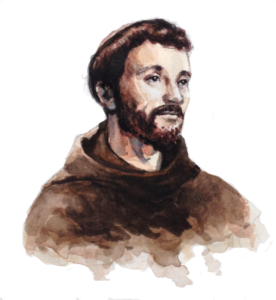Stigmata (Francis of Assisi)

Stigmata (Francis of Assisi)
I do not want to move; I do not want to speak;
I do not want to break this blessed silence.
The night of prayer is gone in the stillness of the dawn,
And morning brings a vision of the cross.
The sun’s rising rays blaze around me; with blinding beams that wound me on the hands.
And I feel terrible pain in the piercing of Your light,
Mingling with a deeper joy within,
As I share your suffering and reflect your wounds of love –
Stigmata that you scar upon my skin!
I dreamed of endless riches, of glory and of fame;
But even my own father cursed my name.
But from this moment onward all I want to claim
Is “Father, Our Father in Heaven.”
Though I’m forsaken by others, Jesus will stick closer than a brother.
Faithful are the wounds of a friend. Faithless are the kisses of an enemy.
I’ve been wounded by the one who bears the wounds of love,
And carry in this mortal flesh His dying.
Background
Getting Catholics and Protestants to agree wholeheartedly about something is no small task. But they seem united in their admiration for Francis of Assisi. I have found Francis to be such an inspiration that I wrote this song about his life.
The title is taken from an event late in his life on September 14, 1224, when after passing the night in prayer, he saw in the sunrise a vision of a figure on a cross. The beams of light touched his body, causing a mingling of great pain and joy. His contemporaries relate that after that, he bore on his body the literal marks of the suffering of Christ, the stigmata, wounds of his hands, feet, and side that resembled in form and color the nails of the cross.
The song is a tribute to Francis, but also intended to proclaim the fact that all believers in Jesus share in his death and his life (Galatians 2:20), and there can be great pain, in addition to the great joy, in being united with the risen Lord.
The Life of Francis of Assisi (1182-1226)
Francis was born at the height of the middle ages in Italy. He spent his youth in riotous parties, revelry, and song. At 20 he was made a prisoner of war and after a time of depression, he began to change his lifestyle, giving away more and more to the poor, visiting the sick, and rebuilding local chapels with his own hands.
One day while he was praying and meditating on Christ’s sacrifice at a local chapel (St. Damian’s), which was nearly ruined, he heard a voice speaking from the cross: “Francis, my house is falling down. Go and build it up again.”
He went straight to the shop of his father, a successful cloth merchant, sold some of the fine cloth and gave the money to the poor priest of St. Damian’s. His father dragged him before the local bishop to demand some of his money back.
To everyone’s amazement Francis returned all the money and even stripped naked and returned the clothes on his back. He declared, “Until this time I have called Pietro Bernardone my father; but now I desire to serve God…from now on I desire to say nothing else than ‘Our father who art in heaven.’” He clothed himself in a simple brown tunic and with chalk etched the outline of a cross on it.
He then began to rebuild the church of St. Damian literally with his own hands. But he sensed his life’s mission even more clearly after hearing Jesus’ instructions to the seventy as they were sent out in Matthew 10:7-13. He attracted a growing number of followers, young men and eventually women, who imitated his life of humility, simplicity, and poverty. Their hallmarks were love, good will, a simple life, and straightforward gospel preaching in the common tongue.
He was a nature lover and literally preached to birds, fish, and other creatures and called all of creation “brother” or “sister.” His most famous writing is the “Canticle of the Sun,” a celebration of the God who made nature. He was also responsible for the first crèche, built at Grecchia at Christmas 1223.
Francis dreamed of preaching not only in Italy, but in other nations, and three times he tried to leave Europe to go to Muslim-controlled lands. In 1219 he managed to get behind enemy lines in Egypt after a bloody battle in the crusades, and he met with the sultan, who was impressed and received him warmly, but did not convert to Christ.
Francis was not a theologian or even a man of great learning. Nor did he rebel against the church. He was a man of great conviction, power, and love, whose greatest accomplishment is the inspiration he has given us by his example. The book of saints summarizes his life this way: “Probably no saint has affected so many in so many different ways as the gentle saint of Assisi who, born to wealth, devoted his life to poverty, concern for the poor and the sick, and so delighted in God’s works as revealed in nature.”
Ponder these things about God’s work in the life of Francis:
-How could a movement that required selling all one’s possessions get so many members in a few years? Do you think this would happen today?
-What might the life of a Francis look like today? Can you name any modern parallel figures?
-What can we learn from his life to put into practice in our own lives?